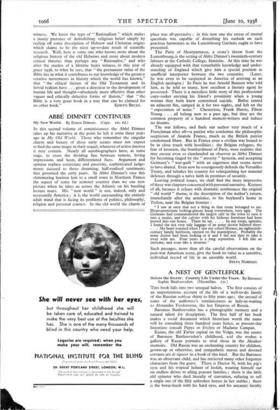ABBE DIMNET CONTINUES
My New World. By Ernest Dimnet. (Cape. tos. 6d.) IN this second volume of reminiscences the Abbe Dimnet takes up his narrative at the point he left it some three years ago in My Old World. Those who remember the singular charm and beauty of those early scenes must not expect to find the same magic in their sequel, whatever of active interest it may contain. Nearly all autobiographers have, at some stage, to cross the dividing line between remote, loving impressions and keen, differentiated facts. Argument and opinion replace conjecture and passivity, sophisticated judge- ments succeed to those dreaming, half-realised sentiments that governed the early years. In Abbe Dimnet's case this shimmering horizon lent to a small town in Northern France the aspect of some far remoter country than we can now picture when he takes us across the Atlantic on his bustling lecture tours. His " new world " is not, indeed, only and necessarily America ; it is the world surrounding the entirely, adult mind that is facing its problems of politics, philosophy, religion and personal contact. In the old world the charm of
place was all-pervasive ; in this new one the stress of mental questions was capable of disturbing his outlook on such gracious harmonies as the Luxembourg Gardens ought to have presented.
The Paris of Montparnasse, a stone's throw from the Luxembourg, is the setting of Abbe Dimnet's twentieth-century labours at the Catholic College, Stanislas. At this time he was already equipped with that remarkable knowledge and under-
standing of England which give him a special position as unofficial interpreter between the two countries. (Later, he was even to be suspected in America of arriving as an
English apologist.) In Paris he met Arnold Bennett who told him, as he told so many, how excellent a literary agent he possessed. There is a merciless little story of this professional copy-seeker envying his friend's proximity when a young woman they both knew committed suicide. Belloc rented an adjacent flat, camped in it for two nights, and left on the " expectation of noise." Chesterton, Frank Harris, Filson Young . . . all belong now to a past age, but they are the common property of a hundred memoir-writers and induce no dreams.
The war follows, and finds our author very much of a
Frenchman after all—a patriot who condemns the philosophic scepticism of Anatole France, much as the British patriot condemned Shaw. But in France even a civilian was bound to
be in close touch with hostilities ; the Belgian refugees, the fear of invasion, the bombardment of Paris, were realities that
may excuse even so clearheaded an observer as Abbe Dimnet for becoming tinged by the " atrocity " hysteria, and accepting
Germany's ".war-guilt " with an eagerness that seems never to have abated. Even now he courageously defends the Versailles Treaty, and rebukes his country for relinquishing her material defences through a naive faith in promises of security.
Leaving political issues, we shall find the more impressive of these war chapters concerned with personal narrative. Keenest of all, because it echoes with dramatic sombreness the original " old world " theme, is the description of the author's return, immediately after the armistice, to his boyhood's home in Tr elon, near the Belgian frontier :
" I saw at once that not a thing in that room belonged to me. Disproportionate looking-glasses hung everywhere, very ugly. The Germans had commandeered the largest café in the town to turn it into a casino, and the cafetier with his hideous furniture had been moved into our house. There he sat. . . . In my room, upstairs, I found the not very tidy luggage of an army doctor billeted there. . . . My heart warmed when I saw my school Horace, an eighteenth- century family heirloom, opened on the mantelpiece. Probably the army doctor had been looking at it and I did not dare to take it away with me. Four years is a long separation. I felt like an intruder, and even like a deserter."
Such passages, more than all the careful observations on the
post-war American scene, give the book its value as a sensitive, individual record of life in an unstable world.
SYLVA NORMAN.










































 Previous page
Previous page